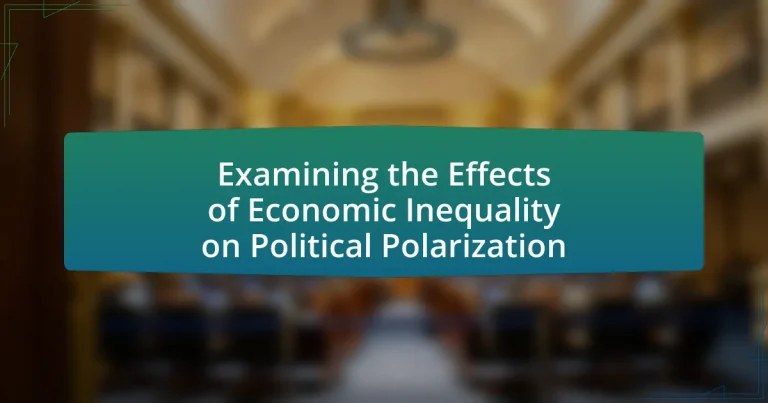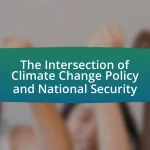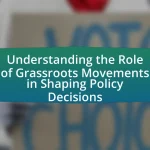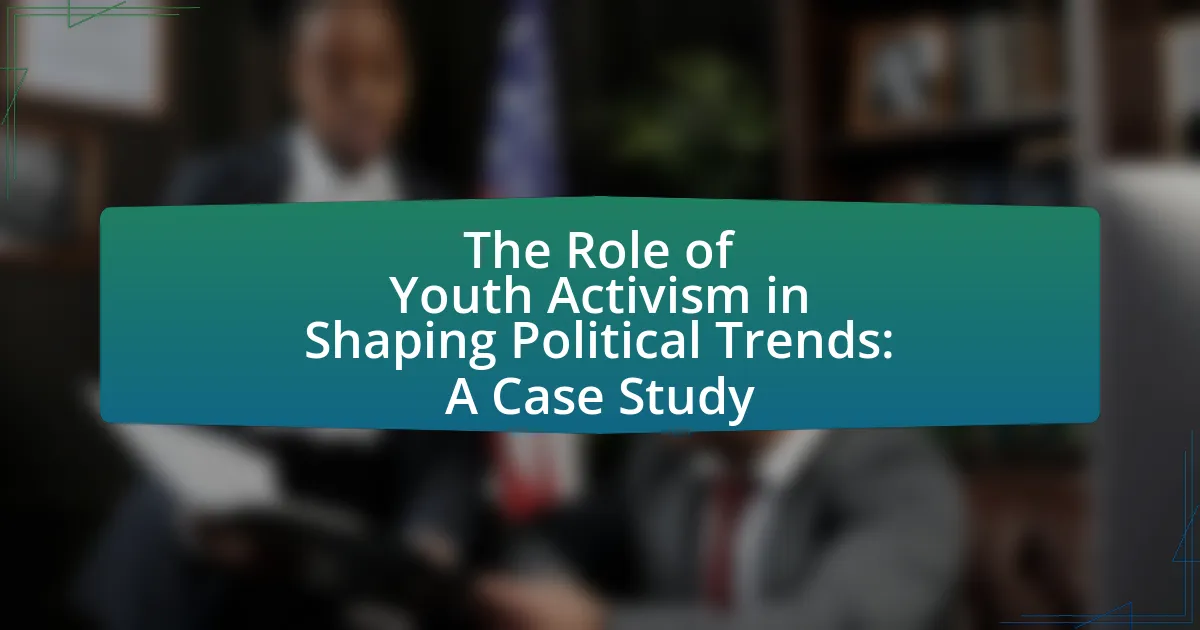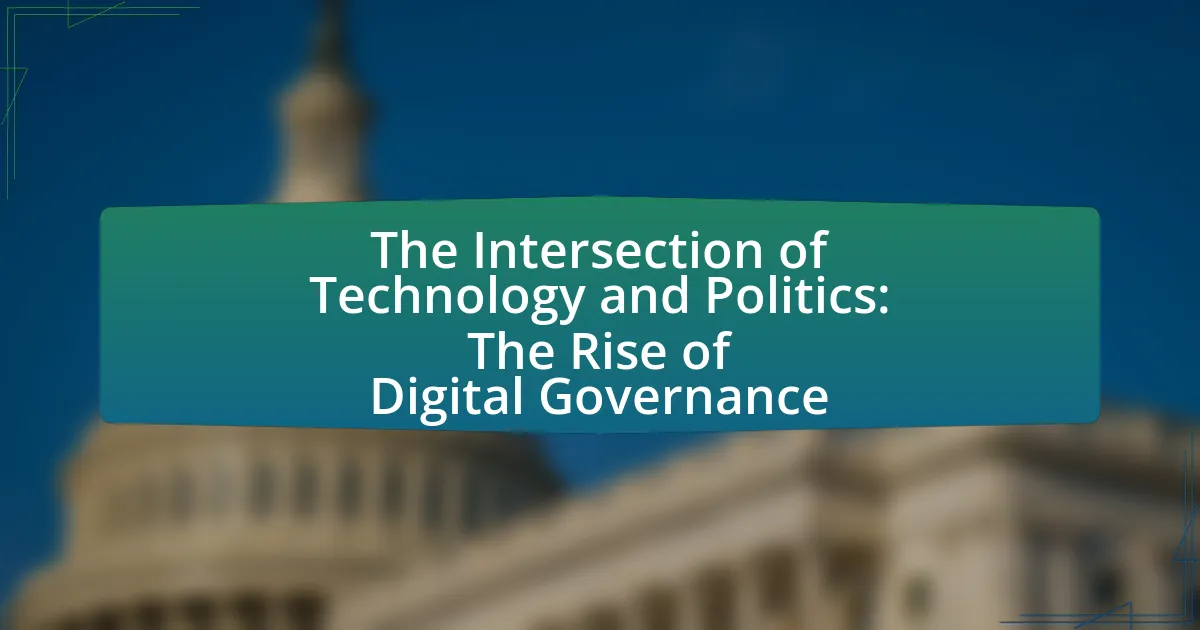The article examines the relationship between economic inequality and political polarization, highlighting how increasing economic disparities contribute to ideological divides among political parties. It discusses the mechanisms linking economic disparity to political beliefs, including social identity formation and resource allocation, and explores how socioeconomic factors shape political affiliations. The article also addresses the implications of this relationship for democratic governance and social cohesion, emphasizing the historical trends and current effects of economic inequality on political behavior. Additionally, it outlines potential strategies for mitigating polarization through policy reforms and education.
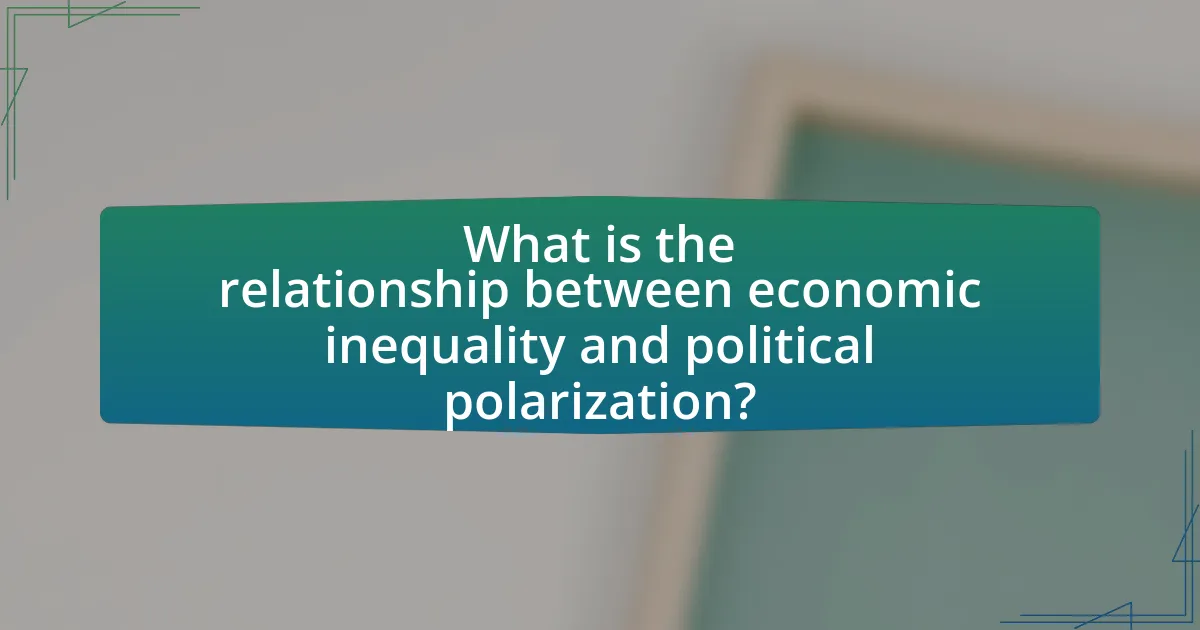
What is the relationship between economic inequality and political polarization?
Economic inequality significantly contributes to political polarization. Research indicates that as economic disparities widen, individuals tend to align more closely with political parties that reflect their economic interests, leading to increased ideological divides. For instance, a study by the Pew Research Center found that in the United States, the gap in political affiliation and attitudes has grown alongside rising income inequality, with wealthier individuals gravitating towards conservative policies while lower-income groups support progressive agendas. This alignment reinforces partisan identities and exacerbates divisions, creating a feedback loop where economic inequality fuels political polarization and vice versa.
How does economic inequality influence political beliefs?
Economic inequality significantly influences political beliefs by shaping individuals’ perceptions of fairness, opportunity, and government responsibility. Research indicates that higher levels of economic inequality correlate with increased political polarization, as individuals from different economic backgrounds develop divergent views on social policies and governance. For instance, a study by McCarty, Poole, and Rosenthal (2006) found that as income disparity grows, political parties become more ideologically distinct, leading to a greater divide in public opinion on issues such as taxation and welfare. This polarization is further exacerbated by the tendency of wealthier individuals to support policies that protect their economic interests, while lower-income individuals advocate for more equitable resource distribution.
What mechanisms link economic disparity to ideological divides?
Economic disparity links to ideological divides through mechanisms such as social identity formation, resource allocation, and political mobilization. Social identity theory suggests that individuals align with groups that reflect their economic status, leading to polarized ideologies. For instance, research indicates that economic inequality fosters in-group favoritism, where wealthier individuals may adopt conservative ideologies that prioritize their interests, while economically disadvantaged groups may lean towards progressive ideologies advocating for social welfare. Additionally, disparities in resource allocation can create divergent political interests, as those with fewer resources may support policies aimed at wealth redistribution, further entrenching ideological divides. Political mobilization also plays a role; economically disadvantaged groups often organize around shared grievances, amplifying their ideological stance against perceived elite interests. Studies, such as those by Piketty and Saez, demonstrate that rising income inequality correlates with increased political polarization, reinforcing these mechanisms.
How do socioeconomic factors shape political affiliations?
Socioeconomic factors significantly shape political affiliations by influencing individuals’ values, priorities, and access to resources. For instance, individuals from lower socioeconomic backgrounds often prioritize economic equality and social welfare, leading them to align with progressive political parties that advocate for these issues. Conversely, those from higher socioeconomic strata may prioritize tax cuts and deregulation, aligning with conservative parties that promote these policies. Research indicates that economic inequality can exacerbate political polarization, as seen in the 2020 U.S. elections, where wealthier voters leaned towards Republican candidates while lower-income voters predominantly supported Democrats. This trend illustrates how socioeconomic status directly correlates with political preferences and affiliations.
Why is understanding this relationship important?
Understanding the relationship between economic inequality and political polarization is crucial because it reveals how disparities in wealth can influence political behavior and societal cohesion. Research indicates that higher levels of economic inequality often lead to increased political polarization, as individuals from different economic backgrounds may develop divergent political beliefs and priorities. For instance, a study by McCarty, Poole, and Rosenthal in “Polarized America: The Dance of Ideology and Unequal Riches” demonstrates that as income inequality rises, the ideological distance between political parties widens, resulting in less bipartisan cooperation and increased social fragmentation. This understanding is essential for policymakers aiming to address both economic disparities and the resulting political challenges.
What are the implications for democratic governance?
Economic inequality significantly undermines democratic governance by exacerbating political polarization. When wealth is concentrated in the hands of a few, it leads to unequal political influence, where affluent individuals and corporations can disproportionately shape policy and public opinion. This dynamic fosters division among the populace, as lower-income groups may feel disenfranchised and alienated from the political process, leading to increased social unrest and a decline in civic engagement. Research indicates that countries with higher levels of economic inequality experience greater political instability and polarization, as seen in the United States, where income disparity has been linked to heightened partisan conflict and reduced trust in democratic institutions.
How does this relationship affect social cohesion?
Economic inequality negatively affects social cohesion by fostering divisions among different socioeconomic groups. When wealth is concentrated in the hands of a few, it creates disparities in access to resources, education, and opportunities, leading to social fragmentation. Research indicates that high levels of economic inequality correlate with increased political polarization, as individuals from different economic backgrounds may develop divergent values and interests, further eroding trust and cooperation within communities. For instance, a study by the Pew Research Center found that economic disparities contribute to a growing divide in political beliefs, which undermines collective social bonds and civic engagement.
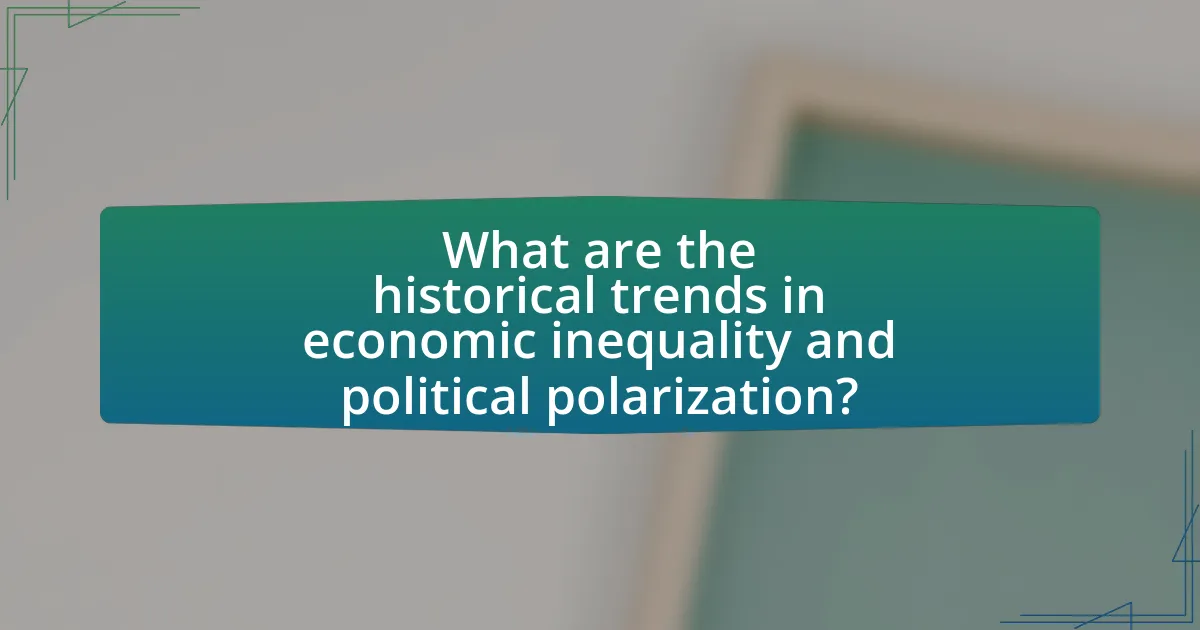
What are the historical trends in economic inequality and political polarization?
Historical trends indicate that economic inequality and political polarization have been closely linked, particularly in the United States since the late 20th century. Economic inequality has increased significantly, with the top 1% of earners capturing a larger share of income, rising from approximately 10% in the 1970s to over 20% by 2020. This growing disparity has contributed to heightened political polarization, as individuals and groups with differing economic interests increasingly align with distinct political ideologies. Research by the Pew Research Center shows that partisan divides have widened, with Democrats and Republicans becoming more ideologically distinct and cohesive since the 1990s. This correlation suggests that as economic inequality rises, so does the intensity of political polarization, influencing voter behavior and policy preferences.
How have economic disparities evolved over time?
Economic disparities have evolved significantly over time, particularly increasing since the late 20th century. In the United States, for example, the Gini coefficient, a measure of income inequality, rose from approximately 0.34 in 1970 to around 0.49 in 2020, indicating a widening gap between the rich and the poor. This trend has been influenced by factors such as globalization, technological advancements, and changes in labor market dynamics, which have disproportionately benefited higher-income individuals while leaving lower-income groups behind. Additionally, the concentration of wealth among the top 1% has grown, with their share of total income rising from about 10% in the 1970s to over 20% by 2020, further illustrating the evolution of economic disparities over time.
What key events have influenced economic inequality in recent decades?
Key events that have influenced economic inequality in recent decades include the 2008 financial crisis, globalization, and tax policy changes. The 2008 financial crisis led to significant job losses and wealth depletion, disproportionately affecting lower-income households while wealthier individuals recovered more quickly due to asset ownership. Globalization has contributed to wage stagnation for low-skilled workers in developed countries, as jobs have shifted to lower-cost labor markets. Additionally, tax policy changes, particularly reductions in top income tax rates and capital gains taxes, have favored the wealthy, exacerbating income disparities. These events collectively highlight the structural factors driving economic inequality.
How have these changes correlated with shifts in political polarization?
Changes in economic inequality have significantly correlated with shifts in political polarization, as rising inequality often leads to increased partisan divides. Research indicates that as wealth concentration grows, individuals from different economic backgrounds develop divergent political preferences, with wealthier individuals tending to support conservative policies while lower-income groups lean towards progressive agendas. A study by the Pew Research Center found that from 1994 to 2017, the ideological gap between Democrats and Republicans widened, paralleling the increase in income inequality, which rose from a Gini coefficient of 0.39 in 1994 to 0.49 in 2017. This correlation suggests that economic disparities contribute to the entrenchment of political identities and exacerbate polarization.
What role do political institutions play in this dynamic?
Political institutions significantly shape the relationship between economic inequality and political polarization. They establish the rules and frameworks that govern political behavior, influence policy-making, and determine how resources are allocated. For instance, in systems where political institutions favor the wealthy, such as through campaign finance laws that allow for large donations, economic inequality can exacerbate political polarization by creating a divide between the interests of the affluent and the general populace. Research by Gilens and Page (2014) in “Testing Theories of American Politics: Elites, Interest Groups, and Average Citizens” demonstrates that economic elites have substantial influence over policy outcomes, which can lead to increased polarization as the interests of the majority are often overlooked. Thus, political institutions play a crucial role in either mitigating or intensifying the effects of economic inequality on political polarization.
How do electoral systems impact economic inequality and polarization?
Electoral systems significantly influence economic inequality and polarization by shaping political representation and policy outcomes. For instance, proportional representation systems tend to reduce economic inequality by allowing for a broader range of political parties, which can advocate for diverse economic interests and social welfare policies. In contrast, winner-takes-all systems often lead to greater economic inequality, as they favor larger parties and can marginalize minority voices, resulting in policies that benefit the affluent. Research by the International Monetary Fund indicates that countries with proportional representation experience lower levels of income inequality compared to those with majoritarian systems. Additionally, electoral systems can exacerbate political polarization; majoritarian systems often create a binary political landscape, intensifying divisions among voters, while proportional systems encourage coalition-building and compromise, which can mitigate polarization.
What policies have been effective in addressing these issues?
Progressive taxation and social welfare programs have been effective in addressing economic inequality, which in turn mitigates political polarization. Research indicates that countries with higher levels of income redistribution through progressive tax systems, such as those in Scandinavia, experience lower levels of political polarization. For instance, a study by the International Monetary Fund in 2014 found that reducing income inequality can lead to more cohesive political environments and decreased polarization. Additionally, social safety nets, including universal healthcare and education, have been shown to reduce economic disparities, fostering a more unified political landscape.
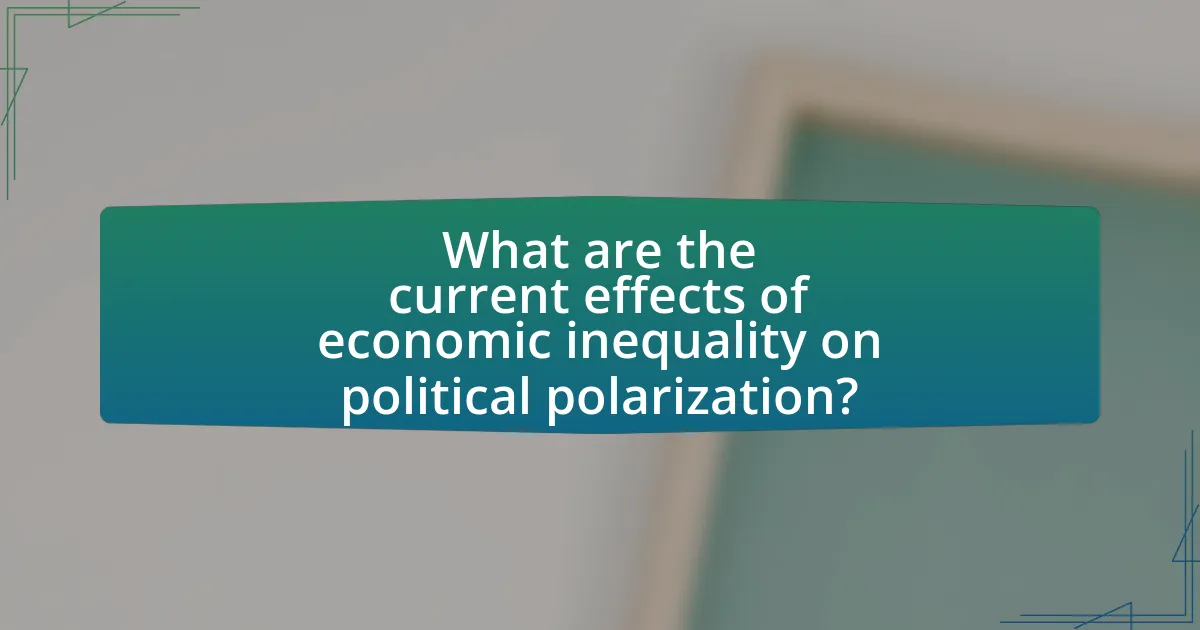
What are the current effects of economic inequality on political polarization?
Economic inequality currently exacerbates political polarization by creating distinct social classes with divergent interests and values. This division leads to increased partisanship, as wealthier individuals tend to support policies that favor their economic status, while lower-income groups advocate for social welfare and redistribution. Research from the Pew Research Center indicates that economic disparities contribute to a growing ideological divide, with 62% of Americans believing that economic inequality is a significant factor in political disagreements. Furthermore, studies show that as economic inequality rises, individuals are more likely to align with political parties that reflect their economic interests, reinforcing polarization.
How does economic inequality manifest in contemporary politics?
Economic inequality manifests in contemporary politics through increased political polarization and the influence of wealth on policy-making. Wealth disparities lead to divergent political interests, where affluent individuals and groups can exert disproportionate influence over political processes, often resulting in policies that favor their interests. For instance, research by the Pew Research Center indicates that individuals with higher incomes are more likely to hold conservative views, while lower-income individuals tend to support progressive policies. This divergence contributes to a widening ideological gap between political parties, exacerbating polarization. Additionally, the concentration of wealth allows for greater funding of political campaigns and lobbying efforts, further entrenching the interests of the wealthy in legislative agendas, as evidenced by the significant increase in campaign spending since the Citizens United v. FEC decision in 2010.
What are the observable effects on voter behavior?
Observable effects on voter behavior include increased political polarization, shifts in party affiliation, and variations in voter turnout. Economic inequality has been shown to exacerbate these effects, as individuals from lower socioeconomic backgrounds often feel disenfranchised, leading to lower participation rates. Research indicates that as economic disparities widen, voters tend to align more strongly with parties that reflect their economic interests, resulting in a more divided electorate. For instance, a study by McCarty, Poole, and Rosenthal (2006) highlights that economic inequality correlates with heightened partisan conflict, demonstrating that voters increasingly support candidates who advocate for policies favoring their economic class.
How does media consumption relate to economic status and political views?
Media consumption is significantly influenced by economic status and political views, as individuals with higher economic status tend to access a wider variety of media sources, which can shape their political perspectives. Research indicates that wealthier individuals are more likely to consume diverse media, including international news and analytical content, leading to more informed political views. In contrast, those with lower economic status often rely on limited media options, which may reinforce existing biases and contribute to political polarization. A study by the Pew Research Center found that 62% of Americans with a household income above $75,000 regularly engage with multiple news sources, compared to only 38% of those earning below $30,000, highlighting the disparity in media consumption patterns linked to economic status. This difference in media exposure can lead to divergent political opinions and increased polarization, as individuals are less likely to encounter opposing viewpoints.
What strategies can mitigate the effects of economic inequality on political polarization?
Implementing progressive taxation and enhancing social safety nets are effective strategies to mitigate the effects of economic inequality on political polarization. Progressive taxation redistributes wealth, reducing income disparities, which can lead to a more cohesive society. For instance, countries like Sweden and Denmark, with high levels of progressive taxation, exhibit lower political polarization compared to nations with significant income inequality, such as the United States. Additionally, strengthening social safety nets, including universal healthcare and education, can alleviate economic stress, fostering a sense of shared community and reducing divisive political rhetoric. Research by the OECD indicates that nations with robust social welfare systems experience less political extremism, highlighting the correlation between economic equality and political stability.
What role can education play in bridging ideological divides?
Education plays a crucial role in bridging ideological divides by fostering critical thinking and promoting understanding of diverse perspectives. Through structured curricula that emphasize civic education, students learn to engage with differing viewpoints, which can reduce polarization. Research indicates that higher levels of education correlate with increased tolerance and open-mindedness; for instance, a study by the Pew Research Center found that individuals with college degrees are more likely to support compromise and dialogue across political lines. This educational exposure equips individuals with the skills necessary to navigate complex social issues, ultimately contributing to a more cohesive society.
How can policy reforms address the root causes of economic inequality?
Policy reforms can address the root causes of economic inequality by implementing progressive taxation, enhancing access to quality education, and increasing minimum wage standards. Progressive taxation redistributes wealth by taxing higher incomes at increased rates, which can reduce income disparity; for instance, countries like Sweden have lower inequality levels due to their tax structures. Enhancing access to quality education ensures that individuals from disadvantaged backgrounds can acquire skills necessary for higher-paying jobs, as evidenced by studies showing that education significantly correlates with income levels. Increasing minimum wage standards directly raises the income of the lowest earners, which has been shown to lift many families above the poverty line, as seen in the U.S. states that have adopted higher minimum wages. These reforms collectively target systemic issues contributing to economic inequality, thereby fostering a more equitable economic landscape.
What practical steps can individuals take to engage in a polarized political environment?
Individuals can engage in a polarized political environment by actively seeking diverse perspectives and fostering open dialogue. Engaging in discussions with people holding different viewpoints can reduce biases and promote understanding. Research indicates that exposure to opposing views can lead to more nuanced opinions and decreased polarization (Pew Research Center, 2020). Additionally, individuals should prioritize critical thinking and fact-checking to combat misinformation, which often exacerbates divisions. By participating in community forums or local political events, individuals can contribute to a more inclusive political discourse, thereby mitigating the effects of economic inequality on polarization.
